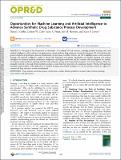Opportunities for Machine Learning and Artificial Intelligence to Advance Synthetic Drug Substance Process Development
Author(s)
Griffin, Daniel J; Coley, Connor W; Frank, Scott A; Hawkins, Joel M; Jensen, Klavs F
DownloadPublished version (2.129Mb)
Publisher with Creative Commons License
Publisher with Creative Commons License
Creative Commons Attribution
Terms of use
Metadata
Show full item recordAbstract
The goals of this Perspective are threefold: (1) to inform a broad audience, including machine learning (ML) and artificial intelligence (AI) academics and professionals, about synthetic drug substance process development, (2) to break down the general synthetic drug substance process development task into more tractable subtasks, and (3) to highlight areas in which machine learning and artificial intelligence might be beneficially developed and applied. Application of machine learning and artificial intelligence to chemical synthesis of medicinal compounds has long been discussed and has resulted in the development of a number of computer-aided synthesis planning tools by both academic groups and commercial enterprises. The focus of these efforts has primarily centered on the task of retrosynthetic analysis, as seen from the perspective of a medicinal chemist. This has left significant unrealized opportunities in the application of machine learning and artificial intelligence to aid the process chemist or engineer in commercial drug substance process development.
Date issued
2023-11-17Department
Massachusetts Institute of Technology. Department of Chemical EngineeringJournal
Organic Process Research & Development
Publisher
American Chemical Society
Citation
Griffin, Daniel J, Coley, Connor W, Frank, Scott A, Hawkins, Joel M and Jensen, Klavs F. 2023. "Opportunities for Machine Learning and Artificial Intelligence to Advance Synthetic Drug Substance Process Development." Organic Process Research & Development, 27 (11).
Version: Final published version